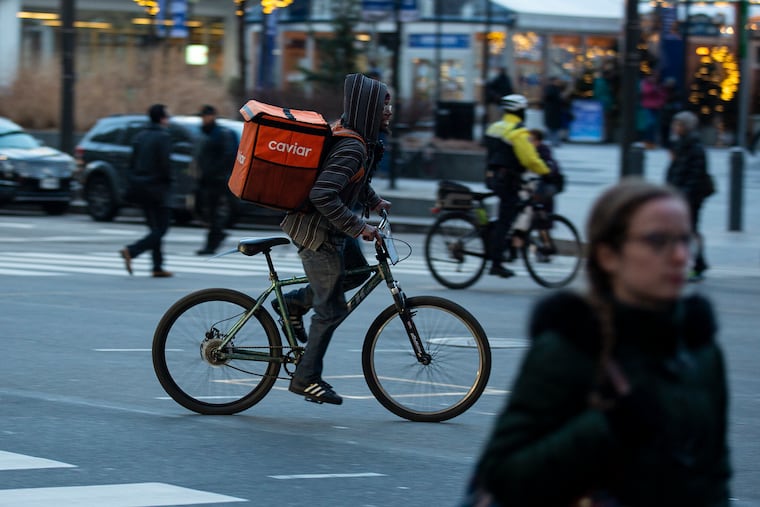Philadelphia is considering bill to allow higher food-delivery fees in exchange for more services
The plan by Councilmember Cherelle L. Parker would affect hundreds of city restaurants, many of which use the delivery services extensively.

City Council will consider changes in the fees charged by food-delivery companies such as DoorDash, Grubhub, and UberEats, which were capped temporarily in 2020 to help restaurants coping with the pandemic-related economic downtown.
Council’s Committee on Commerce and Economic Development on Tuesday approved Councilmember Cherelle L. Parker’s proposal to maintain the fee cap but also allow participating restaurants to opt into a higher fee tier in return for additional services. The full Council is expected to hear the proposal Thursday and could vote on it as soon as Dec. 9.
Since July 2020, the city has capped service fees to restaurants at 15% — 10% for delivery and 5% for marketing — for the duration of the declared public health emergency and for 90 days after. Total fees previously had been 20% to 40% — a figure that restaurateurs testified was too high, given restaurants’ traditionally low profit margins, typically in the single digits.
As cities have moved to make their caps permanent, the services have fought back in court. Philadelphia officials are trying to stave off lawsuits with the option of the higher fee tiers.
In March 2020, the pandemic sent the public to the delivery apps in droves, changing the way many restaurants do business. Darlene Jones, owner of Star Fusion Express in West Philadelphia, told the committee that her delivery traffic soared from 15% to 50% of sales, cutting her profit when forced to absorb the delivery fees. The public, she said, should pay more of the delivery costs.
Councilmember Parker asked the Pennsylvania Restaurant and Lodging Association, which represents 350 restaurants in the city and nearly 4,000 statewide, to meet with representatives of the delivery services to help amend the temporary law. Ben Fileccia, a PRLA policy director, said the meetings were cordial and productive.
Fileccia said the bill was not calling for a permanent cap, per se, preferring to describe it as legislation that would allow the delivery companies to sell premium services, above the 15% cap, to restaurants that opted in.
A DoorDash spokesperson said that while the company opposes legislation that would make commission caps like this permanent “given the consequences they hold for merchants and consumers, we will work with the City Council to best support restaurants in their recovery moving forward.”
A Grubhub spokesperson said “fundamental problems” in the bill remain. “Grubhub maintains a fundamental opposition to government-imposed pricing on private companies and contracts, and believes any legislation driven by the pandemic should be temporary and tied to the COVID-19 pandemic,” the company said.
Both companies cited relief packages that they offered restaurant owners during the height of the pandemic.
Permanent fee caps instituted by other large cities, including New York, have ended up in court. The delivery services have said that permanent price controls are unconstitutional and would drive up costs for consumers.
In an interview, Fileccia suggested that the current system does not favor restaurants — cap or none. “If you’re home and you’re hungry and you order an Uber [to take you to a restaurant], you don’t expect the restaurant to pay for that Uber ride,” he said. “And if you’re home and hungry and order food to get dinner brought to you, why would you expect the restaurant to pay?”